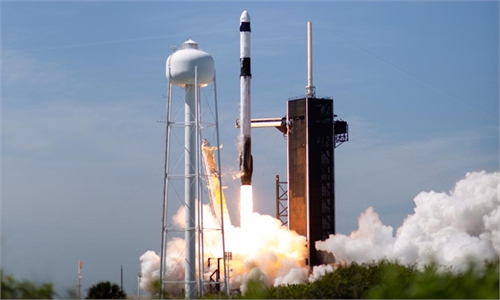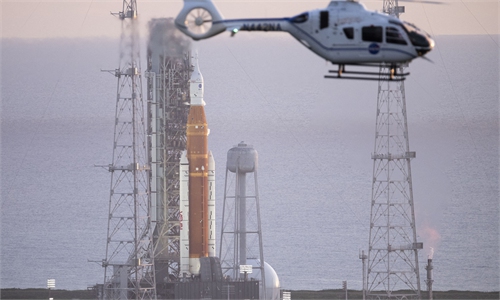SCI-TECH / AIR & SPACE
As US scrubs Artemis launch for 2nd time, Chinese analysts slam highly politicized program

A NASA helicopter flies past the agency's Space Launch System rocket on August 29, 2022. NASA called off the test flight on Monday of its largest-ever Moon rocket, citing engine problem. Photo: AFP
US space agency NASA has been forced to put on hold the launch of the inaugural mission of its ambitious Artemis program for the second time within a week, after the launch team failed to resolve a liquid hydrogen leak despite various troubleshooting procedures ahead of the launch window on Saturday afternoon local time, in what space analysts call a "disappointing but unsurprising" development.
Chinese space analysts said that the issues that led to the delay appear to be "reasonable" given that it has been half a decade since the US managed to launch a mega rocket that is capable of sending humans to Moon. However, they slammed the political considerations and Cold War mentality behind the NASA's Artemis program, which they said could lead to catastrophic outcomes.
The scrub was called at 11:17 am US Eastern time on Saturday, three hours before the beginning of the launch window, which has certainly disappointed some space enthusiasts.
Liquid hydrogen is one of the propellants used in the rocket's large core stage. The leak prevented the launch team from being able to fill the liquid hydrogen tank. It was not the first time hydrogen leaks have bedeviled efforts to fuel the mega Space Launch System (SLS) rocket, as similar ones appeared during dress rehearsals and the first try at launch. However NASA officials described the leak on Saturday as much larger and they are now studying the problem and discussing the next steps, US media reported.
The stack, including the SLS rocket and the Orion spacecraft, has to roll back to the Vehicle Assembly Building, unless they could get a waiver to remain on the launchpad until another attempt, the US officials said, that would not happen during the current launch period that ends on Tuesday. Instead, they said the earliest they could try for another launch would be late September.
NASA Administrator Bill Nelson said that the Space Shuttle was sent back to the Vehicle Assembly Building 20 times before it launched and the cost of two scrubs is a lot less than a failure. "We do not launch until we think it's right," Nelson said. "These teams have labored over that and that is the conclusion they came to. I look at this as part of our space program, in which safety is the top of the list."
The issues so far appeared with the SLS rocket were fairly reasonable, given that the US has paused development of such mega lunar landing rocket since it managed for the last time to send human to the Earth's natural satellite half a century ago, Wang Ya'nan, chief editor of the Beijing-based Aerospace Knowledge magazine, told the Global Times on Sunday.
Wang said that being able to immediately locate the problems with precision itself shows the maturity of the US space launch technology. "Allowing no potential risks during launch is a common practice in the industry," he said.
US NPR reported on Sunday, citing remarks of NASA's inspector general, that each of the first few flights of the Artemis program will cost more than $4 billion, excluding billions of dollars in development stage, and some critics has slammed that the program would be too expensive to be sustainable if NASA continues to depend on this rocket and capsule, both of which come with a hefty price tag.
In fact, the SLS rocket, although inheriting a range of key technology from the Space Shuttle such as the main engines and solid rocket boosters, is no stranger to delays. The rocket is already years behind its original schedule as the US Congress had wanted it to fly in 2016, just five years after NASA retired its aging fleet of space shuttles.
Despite the recent Artemis 1 delays, Nelson said on Saturday that NASA's plan to launch Artemis 2 in 2024 and Artemis 3 in 2025 remain intact.
The US space agency aims to land diverse astronaut crews at previously unexplored regions of the moon - on the Artemis II and Artemis III missions, slated for 2024 and 2025 respectively - and eventually delivers crewed missions to Mars.
However, Chinese space analysts questioned the nature of the Artemis program, which they said is political with strong Cold War mentality, pointing to a recent State of the Space Industrial Base report for 2022 written by US officials with US Space Force, Defense Innovation Unit, Air Force, and Air Force Research Laboratory that claimed that China could overtake the US and become the world's dominant space power "economically, diplomatically, and militarily" by 2045.
The US officials argue in the report released on August 24 that the US must quickly act to maintain its advantage over Beijing, including using more commercial technology and setting long-term, bipartisan policy goals.
"This vision must be as clear and ambitious in scale and timeline as the PRC and more inclusive of international collaboration across the spectrum of commercial, civil and national security space activities," the report says. "For the first time, participants expressed concerns that China appears to be on track to surpass the US as the dominant space power by 2045 or potentially earlier unless proactive measures are taken now to sustain our nation's leadership."
It shows the US' lack of self-confidence, and by picturing China as an imaginary enemy in space and promoting space colonialism, Washington is trying to repeat the Space Race it engaged with the Soviet Union during the Cold War, Song Zhongping, a space observer and TV commentator, told the Global Times on Sunday, adding that such a mentality, which contains nothing scientific but purely political aims, could lead to catastrophic outcomes to the current tight-scheduled Artemis program.
Song also battered the so-called China-excluding international collaboration the US is targeting as "hypocritical," saying that such narrow-mindedness and selfish acts would only hinder human beings' advancement as a whole in the space exploration.



